Singapore Athletics continues to implode with infighting and politicking a huge hurdle
SINGAPORE — There was once a time when Singapore’s track and field athletes struck fear in the hearts of their regional rivals.
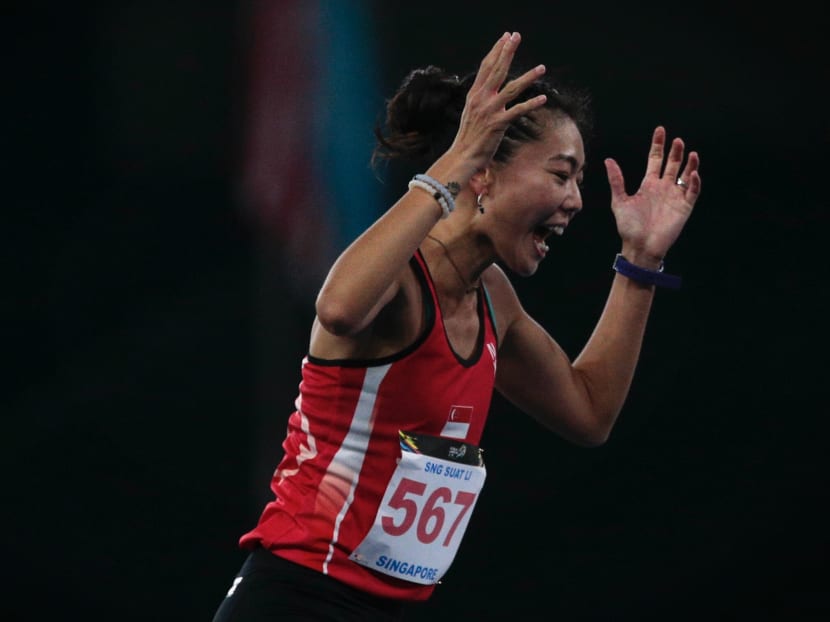
The success of Michelle Sng in the women’s high jump at the SEA Games, was largely attributed to her grit and perseverance, taking time off work and paying her own way – with some help from the Government and sponsors – in order to train and compete overseas. Photo: Jason Quah/TODAY
SINGAPORE — There was once a time when Singapore’s track and field athletes struck fear in the hearts of their regional rivals.
In contrast to its perennial underachiever status in recent times, Singapore athletics once enjoyed a golden era in the 1960s and 70s, when the likes of Chee Swee Lee, Heather Siddons-Merican and C Kunalan dominated the track and field scene in South-east Asia and beyond.
But the golden sheen has vanished since, as evidenced by three decades of poor performances at the SEA Games. At the recent SEA Games in Kuala Lumpur (KL), its 29-strong squad won just two out of the 45 gold medals on offer.
Even then, the success of Soh Rui Yong and Michelle Sng in the men’s marathon and women’s high jump respectively, was largely attributed to the grit and perseverance of the athletes, who took time off from work and paid their own way – with some help from the Government and sponsors – in order to train and compete overseas in the United States and Australia.
Bogged down by infighting and politicking among its executive committee (exco) members, Singapore Athletics (SA) hit the headlines in the run-up to the KL Games for all the wrong reasons.
The internal squabbles eventually descended into a farcical attempt by the national sports association (NSA) to hold a snap election to re-elect its management committee (MC) before it was called off after intervention by International Olympic Committee member Ng Ser Miang.
A dispute between its technical director Volker Hermann and Margaret Oh, the coach of Shanti Pereira, over the location of a training camp saw SA threatening to boot the 2015 SEA Games 200m champion out of its women’s 4x100m relay team. The disagreement then took a nasty turn, as leaked Whatsapp group chat messages between Govindasamy Balasekaran, its vice-president of training and selection, and SA staff appeared to show Balasekaran instructing them to “get good evidence” so that disciplinary action could be taken against Oh and another coach, David Yeo.
As a result, Sport Singapore (Sport SG) and the Singapore National Olympic Council (SNOC) were forced to step in and set up a committee to take over the management of the SEA Games squad.
Former and current athletes, sports administrators and observers whom TODAY spoke to said that SA has hindered, rather than helped the sport and its athletes.
After losing her 200m crown in KL, a heartbroken Pereira told media that she had been affected by the saga. “I’d be lying if I said it didn’t,” she said. “But I got over it and found a way to push through.”
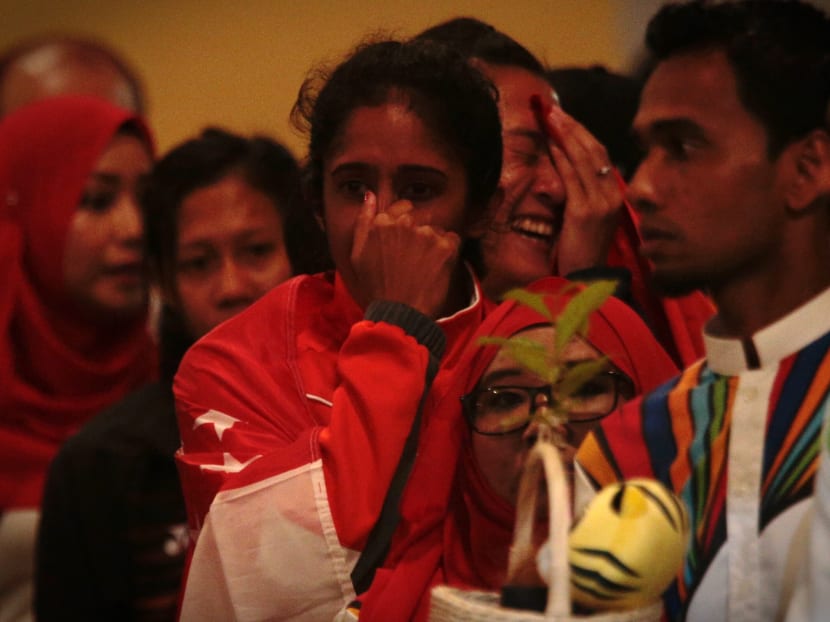
Soh, who successfully defended his men’s marathon gold in Kuala Lumpur, told TODAY that the rot in the SA lies even deeper, with its secretariat also adding to the sport’s woes.
The 26-year-old had run into issues when questioning the secretariat staff on the late payment of his training allowances, and he did not mince his words. “They need to get rid of some people who are working there and not contributing,” he said.
“There doesn’t seem to be any genuine interest to help the athletes. The secretariat needs to be good, and some of them are not up to par.”
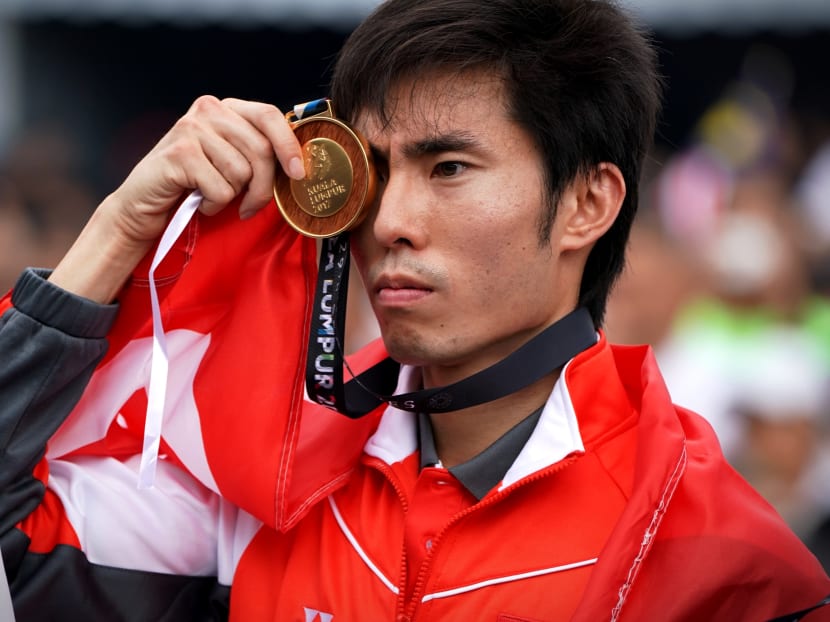
Others like Rachel Yang also ran into problems with SA. The pole vaulter was recently left stranded at Hong Kong International Airport after a competition as prior arrangement for storage space for her equipment in her return flight had not been made by the secretariat.
While the NSA may be in shambles, athletics’ problems date further back to the 1980s, when long-serving chief Loh Lin Kok ruled the sport with an iron fist for close to three decades.
Under his leadership, the association, then known as the Singapore Amateur Athletic Association, was embroiled in a number of disputes with its athletes – including top sprinters Haron Mundir and UK Shyam – and even had its annual funding frozen for two financial years due to a disagreement with the then-Singapore Sports Council. Poor performances at the SEA Games also saw the NSA and Loh coming under intense fire from the authorities.
As the association continues to implode, Shyam, told TODAY that he is disappointed to see that it has not been able to sort out its problems after so many years.
“I feel very disappointed that I’m still seeing this,” he said. “In those days, there was no infighting, the officials were all on the same page, but the policies were not conducive to encourage athletes.
“Now there is fighting between two camps…that is not good as preparations for the SEA Games couldn’t go as smoothly. A lot of things have to change.”
IS THERE LIGHT AT THE END OF THE TUNNEL?
SA president Ho Mun Cheong does not appear to have any answers to fix its problems despite acknowledging that the infighting and squabbles had distracted the exco from doing its job properly.
“A lot of time and energy was spent on this (infighting) instead of helping the athletes and we couldn’t move forward,” said Ho, who was elected president in July last year.
Ho said that the SA needs to call for an extraordinary general meeting (EOGM) in order to re-elect the team. “We need to have a fresh team, and maybe we need new leadership. The changes in the management committee and secretariat are a matter of time and they have to be changed,” he said.
“It’s a matter of getting the right people with passion, and with the right interests at heart.”
Frustrated sports administrators have called for the sport to get its act together.
Toh Boon Yi, chief of the Singapore Sports Institute, said: “Athletics continues to be a work in progress … what we need to do is continue to work with the fraternity to study how to address the long-term issues, and back it up with resources and commitment.
He also called for more professionalism in NSAs. “Sports has reached a point where it has to be more professional,” he told TODAY after the SEA Games.
“The rest of the world has moved up so we need to benchmark and level up. If we continue with the old approach, where we are solely reliant on the loyalty and commitment of volunteers without any professional help, then it will stagnate.
“For athletics, they’re not even there yet. How do we professionalise it, establish a structure to think long term, bring in professionals, whether it’s coaches, technical director, and administration?”
Ong Yeok Phee, who was the association’s general manager from 2010 to 2012, agreed that the sport needs to be more professionally run. He said: “Passion is one thing, managing people is a different ball game.
“The professionalism is not there…volunteers think it is not their responsibility but their roles are as important as paid staff and they must behave like that.
“They have to have a plan, and the athlete has to be the centre of the sport.”
HUNGER, DRIVE NEEDED
While the consensus among former and ex-athletes, administrators and observers whom TODAY spoke to was that Singapore is not lacking in sports talents, much work needs to be done before its athletes can become a force to be reckoned with on the regional stage.
Kunalan, who won a silver in the men’s 100m at the 1966 Asian Games, said that coaches and athletes need to take a hard look at themselves, rather than just point fingers at the association.
“We have to get better…they can turn around and say the association has all these problems. But look at the selection criteria, for SEA Games it is easy, but they haven’t reached that level.
“If you can’t reach SEA Games level, are you training correctly? For coaches, what are they doing to reach that level? Is the expertise, sports science lacking? Let’s look at this aspect.”
Shyam said the SA should take a leaf from the Singapore Swimming Association, which has worked successfully with the swimming clubs to help spot and develop young talents for the future. He said: “Their eco-system is totally different from track. Even if you take the SSA out of the equation, the swim schools have created an eco-system to sustain talent, with former swimmers like Ang Peng Siong and David Lim who have been to the highest level as athletes back in the system and running it.
“We are not geared towards the long term. You have foreign coaches here for three to four years, getting to know the local environment, but subsequently replaced by anothers. The athletes suffer because they have to work with someone new…they take two steps forward and then three steps back.”
Confusion over the selection criteria for the KL SEA Games had also surfaced before the August event, with some questioning the SA and the SNOC’s selection of the men’s 4x400m relay team, which was given the nod for the Games despite not racing or clocking a qualifying time together.
Shyam also pointed out that the lack of a clear selection criteria was not beneficial to development, as athletes will not be driven or hungry to improve and fight for places.
Soh agreed, as he added: ““Too many athletes are content just going to the SEA Games, and being the best in Singapore.
“The SEA Games shouldn’t be the end result. It should be the start to achieving something more.
“They’re a bit too comfortable in their positions, and the intensity in training and desire is not there. In Singapore, if you run 70km in training, people think you’re doing a lot, but when I was in the US, I saw them doing 120km a week. This is what it takes to be great.
“Athletes can blame the association, but some of them are just not hungry, not working hard enough.
“Coaches need to get better, they’re too comfortable doing what they’ve been doing for years. The coaching capacity and sports science are lacking.”
Other athletes such as sprinter Dipna Lim-Prasad, who won two silvers in the 400m and 400m hurdles, and Sng, believe all hope is not lost for the sport.
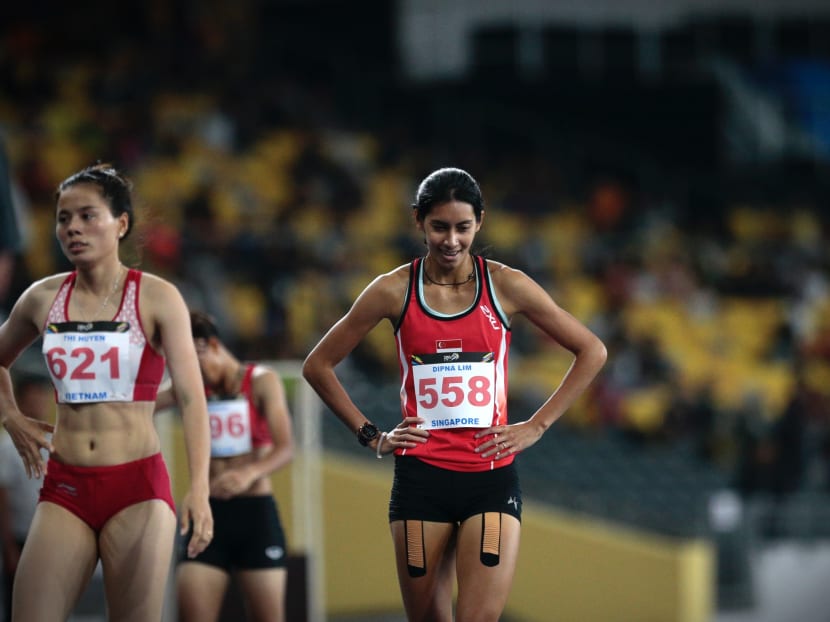
Lim-Prasad called for a more collaborative effort from all of the sport’s stakeholders, as she told TODAY: “Ultimately the most important thing is that the whole ecosystem is here to help, and that encompasses SA and the athletes, the stakeholders in terms of the affiliates and schools and also the government and private sector.
“Ultimately to get to where we hope to be and catch up with all the other countries, it’s really something that the whole community really has to work towards. It’s going to take a long time, but we need to start now, if not it’ll never happen. We can’t keep putting it off, the sooner we start the sooner we can chip away at it.”
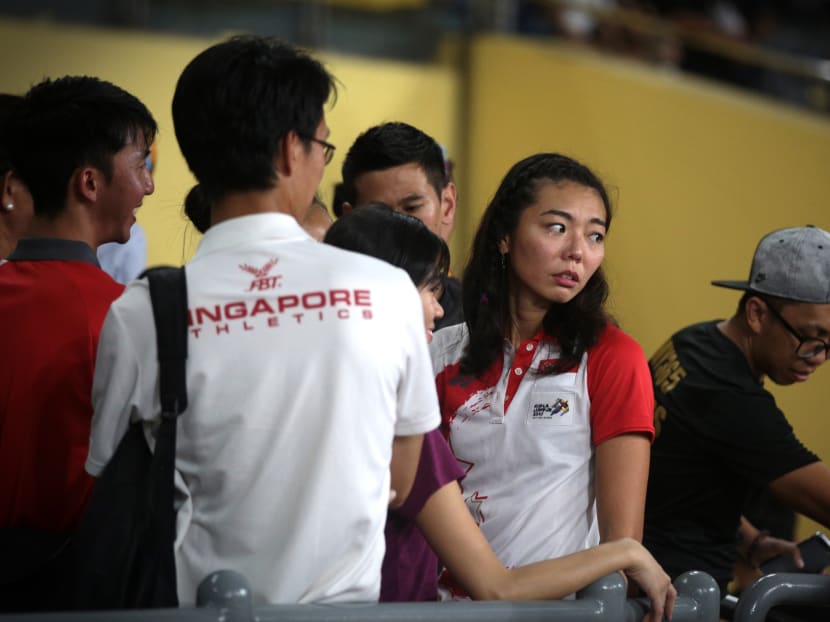
Sng, who had started a high jump movement with other like-minded athletes to help grow the sport, added: “First thing we need to do is to grow the base and retain the talent, and hope there are avenues provided by the administrators and association to allow athletes to pursue this professionally.
“A good support system is required, especially for those moving up to senior level. The association is getting feedback from athletes and we are going to work together, because we have the potential to do a lot better than what we’ve done so far, I’m positive that moving forward, with the help of Sport Singapore as well, that things can only get better.” ADDITIONAL REPORTING BY TEO TENG KIAT
Read more:
The Big Read: For SEA Games under-performers, the rot starts at the top





